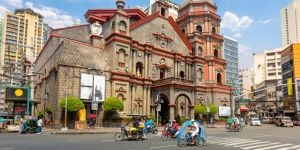All Doctors here are terrible
Does anyone else here notice the lies and desperation of the medical doctors here, especially when it comes to them dealing with foreign patients?
Like being overcharged, admitted to the hospital for longer times than necessary, prescribing of unnecessary medications that they'll tell you to only buy from their office, fear mongering, giving a set price for surgery and then end up doing less work (like sending samples to the lab to check for cancerous cells), saying to pay directly at their clinic to the receptionist because the hospital will charge 3% on top of the fees even if paying with cash, doctors lying saying their kids went to school in the same state as you, doctors telling you to buy this P50,000 machine to help with your child's asthma but can only be bought through him, doctors not offering vaccines because they're making money off of your hospitalization, doctors talking about their patients to their colleagues so they all charge high prices but then able to eventually find a better, more competent doctor for the usual P500?
I'm sure there's more that I've personally experienced and I've heard from others. I'm just wondering if anyone else notices these trends and some of them will go to extreme lengths to try to get the patient so sick so there's no option left but for an expensive hospitalization?
I have always been happy of my Filipino doctors, very human and compassionate. The private hospitals are a business like in the US
Hello Yellowdoh
I have experienced both, a local Filipino doctor (P400) and very caring. Maayo Medical Clinic, a business designed to make money with extra tests and higher price prescriptions. Their doctors are mainly overseas trained so their English is good.
regards Bruce
I have not had any problems, there knowledge is good, sadly what the medical services industry lake is the high tech equipment available in a 1st world city. Or the specialist Surgeon
Having said that, in Australia any where out of a major city, they also don't have access to the latest equipment, or many specialist.
I go to the Doctor Hospital and have discovered the best and quietest time to visit the out patients, so the wait time is not bad. Of course for an emergency they will see you straight away, my GF had asthma, she was sent straight into see the Dr on duty.
geolefrench wrote:I have always been happy of my Filipino doctors, very human and compassionate. The private hospitals are a business like in the US
I had a good experience with a US trained doctor in Baguio. A specialist, very kind and attentive but charged so cheap that I felt guilty of the price. He charged me like 5USD (22years ago) and a specialist like him then could have charged me like 120USD in the US.
GoDees wrote:Hello Yellowdoh
I have experienced both, a local Filipino doctor (P400) and very caring. Maayo Medical Clinic, a business designed to make money with extra tests and higher price prescriptions. Their doctors are mainly overseas trained so their English is good.
regards Bruce
It´s a running business like anywhere else...
pej1111 wrote:I have not had any problems, there knowledge is good, sadly what the medical services industry lake is the high tech equipment available in a 1st world city. Or the specialist Surgeon
Having said that, in Australia any where out of a major city, they also don't have access to the latest equipment, or many specialist.
I go to the Doctor Hospital and have discovered the best and quietest time to visit the out patients, so the wait time is not bad. Of course for an emergency they will see you straight away, my GF had asthma, she was sent straight into see the Dr on duty.
Asthma is very life threatening. They better see the patient right away.
Yellowdoh wrote:Does anyone else here notice the lies and desperation of the medical doctors here, especially when it comes to them dealing with foreign patients?
Like being overcharged, admitted to the hospital for longer times than necessary, prescribing of unnecessary medications that they'll tell you to only buy from their office, fear mongering, giving a set price for surgery and then end up doing less work (like sending samples to the lab to check for cancerous cells), saying to pay directly at their clinic to the receptionist because the hospital will charge 3% on top of the fees even if paying with cash, doctors lying saying their kids went to school in the same state as you, doctors telling you to buy this P50,000 machine to help with your child's asthma but can only be bought through him, doctors not offering vaccines because they're making money off of your hospitalization, doctors talking about their patients to their colleagues so they all charge high prices but then able to eventually find a better, more competent doctor for the usual P500?
I'm sure there's more that I've personally experienced and I've heard from others. I'm just wondering if anyone else notices these trends and some of them will go to extreme lengths to try to get the patient so sick so there's no option left but for an expensive hospitalization?
Hi Yellow and welcome to the forum, hope to hear more from your experiences though mine are vastly different and would concur with other contributors here that personally over the years have never been over charged and like another member often felt undercharged, normal doctors visit in our local private hospital (Lorma in La Union) is php 400, last visit was 300,,,,,,, felt guilty but they said sir you are a senior and get a discount,,,,,,, I was 59 earlier this year when I visited,,,,,,,, perhaps I have aged too quickly, lol.
The services and professionalism offered by our local hospital is second to none. Being white seems to make little difference, perhaps more attention but no over charging and appears the wait times are quicker than hospital queues in Oz.
I have to ask what area/province are you living in?
Cheers, Steve.
bigpearl wrote:I have to ask what area/province are you living in?
According to his info, Cebu
Yellowdoh wrote:Does anyone else here notice the lies and desperation of the medical doctors here, especially when it comes to them dealing with foreign patients?
My wife & I have Doctors at St. Lukes, St. Lukes is affiliated with the Mayo Clinic. Depending on the Doctors, some charge 800 pesos and some 1,000 pesos.
When arriving at the Philippines we both had cataract surgery at St. Lukes. My cost was about $2500 USD and my wife actually got paid for being in a study, so no charge for her.
I wanted to pay the Doctor with plastic, but he didn't except plastic, so I paid the hospital with plastic.
My credit card company charges 3% for overseas charges, but pays you 1% cashback with the charge and 1% cashback when you pay. I got this card before I moved to the Philippines, a card with no interest for 20 months, if paid in full before 20 months.
Actually they had a gimmick (catch 22). They charged interest but added it to the cash back totals. Since it was no interest, I made timely payments to make sure it was paid off before 20 months. Actually when the cash back exceeded the balance, I made the last payment with the cash back.
Most of the doctors I have seen in the Philippines (Cebu) have been knowledgeable, professional and compassionate. Very reasonable on fees too. However I cannot say the same about the care that family members of my GF's family have received. It has been hit or miss. Sadly, two of her brothers have died of liver cancer from chronic Hep B, something that is endemic in the Philippines. Not the doctors fault that they died, as it was discovered too late but they were not forthcoming with the truth about their condition and one performed an unnecessary surgery which did nothing. The poor always get screwed in this country. By the way please get those you care about tested for Hep B, 17% of the population has it and 40% of those will die of liver cancer.
pnwcyclist wrote:Most of the doctors I have seen in the Philippines (Cebu) have been knowledgeable, professional and compassionate. Very reasonable on fees too. However I cannot say the same about the care that family members of my GF's family have received. It has been hit or miss. Sadly, two of her brothers have died of liver cancer from chronic Hep B, something that is endemic in the Philippines. Not the doctors fault that they died, as it was discovered too late but they were not forthcoming with the truth about their condition and one performed an unnecessary surgery which did nothing. The poor always get screwed in this country. By the way please get those you care about tested for Hep B, 17% of the population has it and 40% of those will die of liver cancer.
My brother stayed and worked in PI for only about a year and contracted Hep B. You get that anywhere in public places especially in brothels. The cure is expensive and available in the US. If you´re a US veteran, the VA takes care of it with a negotiated price with the manufacturer.
robal
robal wrote:My brother stayed and worked in PI for only about a year and contracted Hep B. You get that anywhere in public places especially in brothels. The cure is expensive and available in the US. If you´re a US veteran, the VA takes care of it with a negotiated price with the manufacturer.
robal
That's the sort of misleading and damaging statement that keeps the stigma and shame about it alive. There are many routes of transmission for Hep B, most require sex or blood contamination. It is NOT easily passed in public places. You may be thinking of Hep A which is not usually fatal. In Southeast Asia Hep B is endemic, and frequently passed from mother to child (familial transmission) which is very common in the Philippines as the poor often cannot afford testing or immunizations, and that's how her two brothers probably got it. They never even knew they had it until their livers began to fail. So of course their wives got it too. It was also commonly passed through blood transfusions in the days before blood was tested. And of course needles and such.
pnwcyclist wrote:robal wrote:My brother stayed and worked in PI for only about a year and contracted Hep B. You get that anywhere in public places especially in brothels. The cure is expensive and available in the US. If you´re a US veteran, the VA takes care of it with a negotiated price with the manufacturer.
robal
That's the sort of misleading and damaging statement that keeps the stigma and shame about it alive. There are many routes of transmission for Hep B, most require sex or blood contamination. It is NOT easily passed in public places. You may be thinking of Hep A which is not usually fatal. In Southeast Asia Hep B is endemic, and frequently passed from mother to child (familial transmission) which is very common in the Philippines as the poor often cannot afford testing or immunizations, and that's how her two brothers probably got it. They never even knew they had it until their livers began to fail. So of course their wives got it too. It was also commonly passed through blood transfusions in the days before blood was tested. And of course needles and such.
I used to work with Hep B at the lab so I know what I´m talking about. My nature as a person is not to mislead and I analyze my statements to make sure it´s consistent with current knowledge and support my statements with facts:
1. Hepatitis B can be caught in public if an infected person spits in public (saliva with blood through bleeding gums, or any bodily fluid like semen with blood) that contaminates surfaces and an individual accidentally contaminates himself and introduces unknowingly to any broken skin surface, mucous membranes of the mouth, genitals, rectum etc.
https://www.emedicinehealth.com/hepatit … s_b_spread
The first 2 items of "How does Hepatitis B spread" points to the fact.
2. Hepaptitis B can survive outside the body for 7 days.
https://risksafety.humboldt.edu/sites/d … 20FAQs.pdf
3. Hepatitis B virus can survive and infect with outside temperatures up to 56 degrees centigrade. Temperatures in the Philippines is below that.
https://www.ncbi.nlm.nih.gov/pubmed/22169694
I know all types of the hepatitis virus. Please update your knowledge!
robal
Ok, thanks for the good links and also confirming what I said, that it's passed through blood and semen.. I have done a lot of research on it also, due to the situation here, I guess where we differ is in the likelihood of getting it in public places. I don't really consider brothels public places. I am aware it remains infectious and I suppose one could somehow get it if you had a crack in your skin and touched a place where someone with bleeding gums spit (the ground?).. but the odds are low.
All that being said, the simplest and best approach is to get vaccinated before traveling to Southeast Asia, as I did and I recommend others do too. And avoid brothels and prostitutes. Sorry to hear about your bro, that's a bummer.
pnwcyclist wrote:Ok, thanks for the good links and also confirming what I said, that it's passed through blood and semen.. I have done a lot of research on it also, due to the situation here, I guess where we differ is in the likelihood of getting it in public places. I don't really consider brothels public places. I am aware it remains infectious and I suppose one could somehow get it if you had a crack in your skin and touched a place where someone with bleeding gums spit (the ground?).. but the odds are low.
All that being said, the simplest and best approach is to get vaccinated before traveling to Southeast Asia, as I did and I recommend others do too. And avoid brothels and prostitutes. Sorry to hear about your bro, that's a bummer.
As you said, it´s endemic in the Philippines and the prevalence in the population give it better chances that they contaminate public places like plazas, public bathrooms, playground areas, buses etc. Could be anywhere. That´s why I added that - as a probable source of infection because of the high percentage of the population afflicted. Introduction of the virus unknowingly through vulnerable human anatomy fulfills Koch´s Postulates.
robal
Make your relocation easier with the Philippines expat guide

Lifestyle in the Philippines
About to move to the Philippines? Wondering how you're going to adapt to your new environment and lifestyle? ...

Developing your social circle in Manila
When moving to a new city, invariably, the friends you meet and cultivate first will make the most impact and can ...

Leisure activities in the Philippines
Consisting of more than 7,000 islands, the Philippines is a real treasure that you can explore during your stay ...

Diversity and inclusion in the Philippines
The culture of the Philippines is very diverse. This is due to the large mix of different nations in this country, ...

Accommodation in Iloilo
Iloilo, nicknamed the 'Heart of the Philippines', is a province stretching over 4,663 km² in the ...

Tax in the Philippines
When moving to the Philippines, especially if you are going to work or set up a business there, you will probably ...

Obtaining a Philippines driving licence
Whether you are converting your existing foreign driving license or applying as a first-timer for a Philippines ...

Accommodation in Cebu
Located in the Visayas region, 750 km from Manila and West of the Negros Island, Cebu is one of the major ...
Forum topics on healthcare in the Philippines






